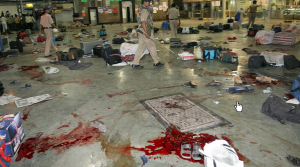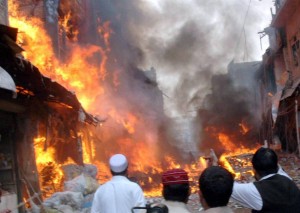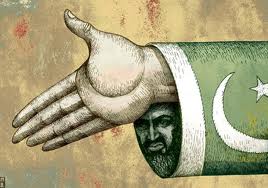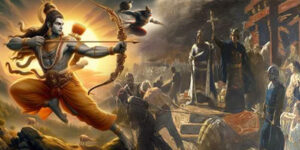 The impending 2014 American withdrawal from its Afghan quagmire is beginning to impact on India in many ways, most manifest of which was the latest episode of Pakistani jihadi violence at the Balnoi sector in the Poonch region along the Line of Control (LOC). Gruesome as it is, the sneak killings of our soldiers Sudhakar Singh and Hemraj Naik and the latter’s beheading by either Pakistani army regulars or possibly Lashkar-e-Tayyaba (LeT) — the distinction between both entities possibly of only academic interests — and the subsequent outrage in India are but pointers to a bigger scenario unfolding in the neighbourhood.
The impending 2014 American withdrawal from its Afghan quagmire is beginning to impact on India in many ways, most manifest of which was the latest episode of Pakistani jihadi violence at the Balnoi sector in the Poonch region along the Line of Control (LOC). Gruesome as it is, the sneak killings of our soldiers Sudhakar Singh and Hemraj Naik and the latter’s beheading by either Pakistani army regulars or possibly Lashkar-e-Tayyaba (LeT) — the distinction between both entities possibly of only academic interests — and the subsequent outrage in India are but pointers to a bigger scenario unfolding in the neighbourhood.
We would be doing ourselves a disservice if we were to lose focus of the bigger objectives and test of resolve that await us. The latest eruption on the border has been followed by the all-too predictable charade of a “flag meeting” between the local Indian commander and his Pakistani counterpart, which not surprisingly, has yielded nought, save a brazen repetition of Pakistani denials of India’s charges. Islamabad has opted to toss counter-accusations at us. We can be sure that this will not be the end of ceasefire violations by Pakistan. For a change, the Indian stance has perceptibly hardened with Army Chief Bikram Singh warning of retaliation (a Pakistani soldier has perished Indian retaliatory crossfire since the gruesome Pakistani perfidy).
 Theories of Pakistan’s civilian establishment being under pressure from the army and jihadi elements are being put forth as ostensible reasons for the latest bout of Paki adventurism on the Kashmir border. While not inaccurate, this is probably insufficient to explain what makes Pakistan believe it can get away with this level of inhuman behaviour. Post-Mumbai 26/11, Islamabad has only been encouraged by the UPA’s pusillanimity on issues of vital concern to India’s national security and interests. While serious dialogue ought to be the norm between nations, it befits only nations that adhere to at least a modicum of civilization. Pakistan, alas, doesn’t qualify, not by a long shot.
Theories of Pakistan’s civilian establishment being under pressure from the army and jihadi elements are being put forth as ostensible reasons for the latest bout of Paki adventurism on the Kashmir border. While not inaccurate, this is probably insufficient to explain what makes Pakistan believe it can get away with this level of inhuman behaviour. Post-Mumbai 26/11, Islamabad has only been encouraged by the UPA’s pusillanimity on issues of vital concern to India’s national security and interests. While serious dialogue ought to be the norm between nations, it befits only nations that adhere to at least a modicum of civilization. Pakistan, alas, doesn’t qualify, not by a long shot.
 In fact, the civilian ruling setup in Pakistan (for whatever it is worth) is already under pressure of the jihadis and the military establishment for “being soft” on India and opening up trade and relaxing travel between the two countries. It is a safe bet that in the present environs, with general elections in Pakistan looming, the Zardari regime wouldn’t want to appear as having backed down from giving a muscular response to an alleged Indian provocation along the LoC. One might as well forget any “Aman” (peace) with our perennially hostile neighbour. But there’s no dearth of dreaming doves on this side. True to form, the country’s appointee Prime Minister took his own sweet time to read out a message of “not business as usual” to Pakistan; his own party wouldn’t have been convinced in the least, leave alone the nation. Indeed, Manmohan Singh’s week-long delay in expressing grief at the horrific gang-rape of the now-deceased Nirbhaya in Delhi speaks for itself.
In fact, the civilian ruling setup in Pakistan (for whatever it is worth) is already under pressure of the jihadis and the military establishment for “being soft” on India and opening up trade and relaxing travel between the two countries. It is a safe bet that in the present environs, with general elections in Pakistan looming, the Zardari regime wouldn’t want to appear as having backed down from giving a muscular response to an alleged Indian provocation along the LoC. One might as well forget any “Aman” (peace) with our perennially hostile neighbour. But there’s no dearth of dreaming doves on this side. True to form, the country’s appointee Prime Minister took his own sweet time to read out a message of “not business as usual” to Pakistan; his own party wouldn’t have been convinced in the least, leave alone the nation. Indeed, Manmohan Singh’s week-long delay in expressing grief at the horrific gang-rape of the now-deceased Nirbhaya in Delhi speaks for itself.
While the lack of a truly long-term strategic culture among India’s ruling establishment is a topic that transcends the scope of this article, we as a people must disabuse ourselves of the nonsense that Pakistan is a normal nation with which we can sit down and do business as we would with any other country. The “after all, they’re people like us” syndrome unfortunately permeates far too many Indian minds and has over the generations, turned out to be a treacherous fault-line our neighbour, born of hatred and bred in unrelenting hostility and violence has been ever willing and ready to exploit. Neither is the Paki army a professional and modern army (again, a pet argument of certain quarters in India) that doesn’t mutilate the corpses of its adversaries. For India, which has endured over eight hundred years of jihadi invasions and brutal Islamic rule, the latest atrocity is déjà vu all over again.
 Notwithstanding a shared pre-colonial history, officers drawn from the British Sandhurst military school and other trappings of Briticisms, the Pakistani army represents not any liberal democracy — Pakistan never was one, in the first place — but a medieval Islamic jihadist horde. The only difference between the Pakistan army and its numerous illegitimate offspring, the Taliban, Lashkar-e-Tayyaba, Jaish-e-Mohammad, Lashkar-e-Jangvi and now of late, the Sipah-e-Sahiba (to hunt Shias) is that the Pakistani soldiers wear uniforms, while the latter do not. Hemraj and Sudhakar aren’t the first Indian soldiers to suffer thus — from the days of the ill-fated Raja Dahir of Sind beginning circa 712 AD, to Veer Sambhaji and our hapless brethren of 1947, this has been one long and continuing grisly tale.
Notwithstanding a shared pre-colonial history, officers drawn from the British Sandhurst military school and other trappings of Briticisms, the Pakistani army represents not any liberal democracy — Pakistan never was one, in the first place — but a medieval Islamic jihadist horde. The only difference between the Pakistan army and its numerous illegitimate offspring, the Taliban, Lashkar-e-Tayyaba, Jaish-e-Mohammad, Lashkar-e-Jangvi and now of late, the Sipah-e-Sahiba (to hunt Shias) is that the Pakistani soldiers wear uniforms, while the latter do not. Hemraj and Sudhakar aren’t the first Indian soldiers to suffer thus — from the days of the ill-fated Raja Dahir of Sind beginning circa 712 AD, to Veer Sambhaji and our hapless brethren of 1947, this has been one long and continuing grisly tale.
Indian generals reveal Pakistani army atrocities on captured Indian soldiers in the wars of 1965, 1971 and the 1999 Kargil war as well. While India’s ruling regimes, in their never-ending quest of the Islamic vote are only too eager to either forget or deliberately cover up Pak-Islamic atrocities, we as a nation can do so only at our peril.
 Terrorism is an intrinsic part of the Islamic war doctrine since the very inception of the faith. “Terror struck into the hearts of the enemies is not only a means, it is the end itself,’ Brigadier S K Malik writes in the Quranic Concept of War, which is the de facto textbook for the Pakistani military doctrine. As the respected Col. Anil Athale (retired) rightly puts it, “One must also remember that the Pakistan army is no longer a professional and monolithic body. The Islamism of the Zia-ul Haq days has percolated down to its junior ranks and individuals are quite capable of acting at the behest of Mohammad Saeed of the Lashkar-e-Tayyaba”. Needless to add, the Islamization of the Pakistani armed forces that began in Zia’s tenure has only proceeded apace, never withered.
Terrorism is an intrinsic part of the Islamic war doctrine since the very inception of the faith. “Terror struck into the hearts of the enemies is not only a means, it is the end itself,’ Brigadier S K Malik writes in the Quranic Concept of War, which is the de facto textbook for the Pakistani military doctrine. As the respected Col. Anil Athale (retired) rightly puts it, “One must also remember that the Pakistan army is no longer a professional and monolithic body. The Islamism of the Zia-ul Haq days has percolated down to its junior ranks and individuals are quite capable of acting at the behest of Mohammad Saeed of the Lashkar-e-Tayyaba”. Needless to add, the Islamization of the Pakistani armed forces that began in Zia’s tenure has only proceeded apace, never withered.
 That Pakistan is eyeing for itself the kingmaker’s role in a post-US Afghanistan in 2014, in pursuance of its illusory “strategic depth vis-à-vis India, is a no-brainer. The creation of this artificial entity called Pakistan in 1947, by the British, with a distinct aim to keep India weak, while having a pliant state they could control, was the actual raison d’être of the West’s machinations in the Partition of India (the historical, cultural and religious reasons for Islamic separatism are a much wider context). While India refused to allow British bases and troops to be stationed in India except over a transition period, Pakistan’s Jinnah had no such qualms. The Muslim League’s sweetness to the British and hostility to India’s freedom struggle have to be viewed in this perspective.
That Pakistan is eyeing for itself the kingmaker’s role in a post-US Afghanistan in 2014, in pursuance of its illusory “strategic depth vis-à-vis India, is a no-brainer. The creation of this artificial entity called Pakistan in 1947, by the British, with a distinct aim to keep India weak, while having a pliant state they could control, was the actual raison d’être of the West’s machinations in the Partition of India (the historical, cultural and religious reasons for Islamic separatism are a much wider context). While India refused to allow British bases and troops to be stationed in India except over a transition period, Pakistan’s Jinnah had no such qualms. The Muslim League’s sweetness to the British and hostility to India’s freedom struggle have to be viewed in this perspective.
However, Pakistan’s promise of a being pliant client of Britain and the West has only partially materialized, because that country has never shed its jihadist genes. It has been a poisonous thorn in India’s side since independence and all pretensions to the contrary, exists only to undo India through terrorism sponsored, directed and abetted by it, amply articulated by the ISI’s doctrine of “death by a thousand cuts” on the hated Hindu enemy that it has been unable to subdue despite a thousand years of blood-soaked jihad.
 The post-independence Indian state, reared on the false doctrine of secularism being equated with “all religions being equal” — and therefore being worthy of “equal respect”, does not have the wherewithal to comprehend the challenges to India’s nationhood — a nationhood that emanates from its cultural and civilizational roots. In actuality, the colonial edifice of polity and administration inherited from the erstwhile colonial masters is itself a morbid threat to the Indian nation and people.
The post-independence Indian state, reared on the false doctrine of secularism being equated with “all religions being equal” — and therefore being worthy of “equal respect”, does not have the wherewithal to comprehend the challenges to India’s nationhood — a nationhood that emanates from its cultural and civilizational roots. In actuality, the colonial edifice of polity and administration inherited from the erstwhile colonial masters is itself a morbid threat to the Indian nation and people.
 Coming to Pakistan, its bravado in its dealings with India, borders on madness. Even the semblance of national entity in that country collapsed in 1971, with the breakaway of what is now Bangladesh, exposing the utter hollowness of Pakistan’s claim to being a nation. Its latest shenanigans may well be a portent of the implosion of this jihadist state, with all its attendant consequences for the region and the world.
Coming to Pakistan, its bravado in its dealings with India, borders on madness. Even the semblance of national entity in that country collapsed in 1971, with the breakaway of what is now Bangladesh, exposing the utter hollowness of Pakistan’s claim to being a nation. Its latest shenanigans may well be a portent of the implosion of this jihadist state, with all its attendant consequences for the region and the world.
Pakistan can never dream of equaling India in strength and economic power — not now nor in the time to come. With the US planning to withdraw from Afghanistan in 2014, the sinister vacuum looming in India’s northwest dictates a proactive Indian role — either now or later. The diplomatic, political and military perspectives are a different topic of analysis.






























